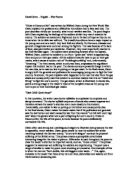As a gas attack surprises the exhausted soldiers, Owen creates a dramatic scene in which the men push themselves to the limit to fix their helmets. Using highly dramatic punctuation and word choice, Owen exposes the shock and urgency the soldiers experience:
“GAS! GAS! Quick boys! – An ecstasy of fumbling”
(Line 9)
In one short line three exclamation marks and capital letters in “GAS!” are used to emphasize the utmost fear and panic the soldiers are facing. The hyphen after these harsh, sharp words is used to underline the more subtle tone but never the less dramatic of the words that follow. “ecstasy”, despite the irony suggests the soldiers are in a morbid and nervous state, incapable of co-ordinating their minds with their incoherent bodies. This is reinforced by “fitting the clumsy helmets” in which personification is used to indicate the lack of co-ordination, dexterity and emotional strength the soldiers demonstrate.
Owen sets the scene of the gas attack superbly. Using intense and metaphorical language he manages to create a picture that seems almost reality as a man fails to secure his helmet.
“And flound’ring like a man in fire or lime”
(Line 12)
This simile describes a man in agony. Calcium Oxide was used to burn through flesh during the war and was a lime green colour. The poet’s use of “lime” has connotations of agonizing pain as the flesh burns unmercifully whilst “flound’ring” highlights the writhing and squirming of the soldier’s pain. Owen creates a vivid, intense picture of a man almost dancing with hysteria and agony.
Owen pleads with the reader to justify his argument by forcing us to put ourselves in his position. He reveals the gruesome and sickening sight he and many others endured when they threw their fellow comrade in a wagon:
“And watch the white eyes writhing in his face,
His hanging face, like a devils sick of sin”
(Lines 19-20)
Here, “writhing” is used to describe his eyes moving about in his head. Also, alliteration is featured. The next line is a particularly gruesome simile as “hanging face,” suggests that he has no control of his body so it becomes distorted and abnormal. “devil’s sick of sin” highlights the sickening image of such a face and implies even the devil would get sick of doing evil.
As the title is denounced in the last lines of the poem, Owen attacks the people at home who support the war unaware of its’ realities. He powerfully urges the reader to imagine the panic and urgency that results in a man being flung in a wagon. With furious determination, Owen expresses his disgust over children believing war is a good thing.
“To children ardent for some desperate glory”
(Line 26)
Owen exposes the lie as giving children a false hope and sense of reality. He reveals that brainwashing children into passion for a horrific experience they could face one day, is disgusting and immoral. “children” reinforces the theme of innocence as it is juxtaposed with “desperate” which suggests that children crave what they think of an adventure: Owen brutally contradicts this.
“Dulce Et Decorum Est” is an accurate account of the horrors the brave, young soldiers faced during the war. Wilfred Owen justifies his anti-war protest by revealing the true nature of war.
Through descriptive language, word choice and imagery, the reader is given the opportunity to see past the idea of war being noble and honourable. Owen exposes war for what he believes it really is; a disgusting waste of life.
The reader feels forced to explore this issue further as war is a relevant topic today. Owen presents his account on war in a desperate plead for us to understand the horrors the men endured: a project proven more than successful.
Kathleen Gillies
825 words







